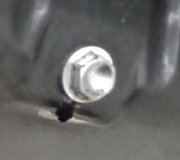Oil volume goes up at higher engine speeds. When engine bearings are worn, the oil leaks out past them faster than intended so pressure goes down. The size of that leak stays constant so a higher volume of oil being pumped overcomes that controlled leakage.
Think of cutting off your finger! Blood rushes out so your blood pressure goes down. If the doctor pumps in blood from a transfusion, your blood pressure goes back up. This is comparable to the normal, controlled oil leaking from the internal engine bearings. (That oil sprays around onto other things to lubricate them). The oil pump in your engine is pumping in the needed oil to get the pressure back up.
Now, heaven forbid, you cut off a second finger! That means blood loss is greater and pressure goes down again. The doctor has to speed up the machine so it pumps in new blood faster. That's what gets the pressure back up to normal. In the engine, raising speed makes the oil pump run faster and pumps more volume of oil so the pressure goes back up.
One thing you'll notice from my story is there are TWO things that can cause low oil pressure at low engine speeds. I mentioned the worn engine bearings that let oil leak out too fast because that is the most common cause, but a weak oil pump can cause the same symptoms. That is much less common. There are aftermarket "high-volume" oil pumps made for some engines but they are intended for high performance or racing applications. They are not meant to overcome the effects of worn bearings. In fact, once the wear has started to take place with the bearings, it will continue in spite of the extra oil. Eventually the hammering action from metal parts banging against each other will destroy them resulting in a much bigger repair bill. So, the higher output oil pump only solves the problem for the short term. It isn't a permanent fix.
Thursday, June 2nd, 2011 AT 5:01 PM


